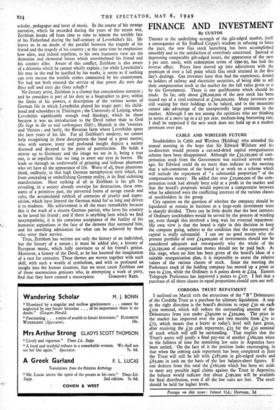FINANCE AND INVESTMENT
By CUSTOS
THANKS to the underlying strength of the gilt-edged market, itself a consequence of Sir Stafford Cripps's wisdom in refusing to force the pace, the new Gas stock launching has been accomplished smoothly and to the satisfaction of everybody concerned. Instead of depressing comparable gilt-edged issues, the appearance of the new 3 per cent. stock, with redemption terms of 199o-95, has had the reverse effect. Prices have moved up into adjustment with the premium of over a full point which Gas stock attained in the first day's dealings. Gas investors have thus had the experience, denied to holders of railway and electricity securities, of being able to sell their compensation stock in the market for the full value given to it by the Government. There is one qualification which should be made. So far, only about £68,000,000 of the new stock has been issued out of a total estimated at £zoo,000,000. Many investors are still waiting for their holdings to be valued, and in the meantime cannot take advantage of the unexpectedly large premium in the market. Although I am not among the optimists who are thinking in terms of a move up to a 2+ per cent. medium-long borrowing rate, I shall be surprised if the new stock does not hold up at a modest premium over par.
CABLE AND WIRELESS FUTURE Stockholders in Cable and Wireless (Holding) who attended the annual meeting in the hope that Sir Edward Wilshaw and his co-directors would present a cut-and-dried capital reorganisation scheme have been disappointed. Although the £32,195,000 of com- pensation stock from the Government was received several weeks ago, Sir Edwk-cl could do no more than indicate to the meeting that a sub-committee of the board is at work on a scheme which will include the repayment of " a substantial proportion " of the compensation money. He added that over £io,000,000 of the corn- pensation stock had already been sold at a profit in the market and that the board's proposals would repres!nt a compromise between what he admitted were the conflicting interests of the various classes of stockholders in the group.
City opinion on the question of whether the company should be liquidated or remain in business as a large-scale investment trust is sharply divided. There can be little doubt that the best interests of Ordinary stockholders would be served by the process of winding up, even though this involved a long wait for eventual repayment. My own view is that the board is right in this decision to keep the company going, subject to the condition that the repayment of capital is really substantial. I can see no good reason why the present portfolio of over £14,00o,000 of investments should not be considered adequate and consequently why the whole of the £32,195,00o of compensation money should not be paid back. At this stage, when no hint has been given of the board's ideas of a suitable reorganisation plan, it is impossible to assess the relative values of the various classes of stock. Since the meeting the Preference stock of the holding company has moved up a point or two to £120, while the Ordinary is 6 points down at £224. Eastern Telegraph Preference has improved 2 points to £127. I feel that a purchase of all three classes in equal proportions should turn out well.
CORDOBA TRUST REPAYMENT
I outlined on March nth the attractions of the "B" Debentures of the Cordoba Trust as a purchase for ultimate liquidation. A step in the right direction is the board's decision to repay £50 on each Doo nominal, which will reduce the outstanding amount of the Debentures from just under £64o,000 to £320,000. The price in the market has improved over the past two months from £70 to £75, which means that a buyer at today's level will have given, after receiving the £50 cash repayment, £25 for the £50 nominal of stock which will still be outstanding. That implies that the Trust's assets will justify a final pay-out of another £16o,00o when in the fullness of time the remaining law suits in Argentina have been settled. On the face of it the position looks encouraging, in that when the coming cash repayment has been completed in June the Trust will still be left with £287,000 in gilt-edged stocks and £63,000 in cash on the basis of -the last balance-sheet figures. If one deducts from this total the £16o,000 which has been set aside to meet any possible legal claims against the Trust in Argentina, the balance would indicate that about £190,000 will be available for final distribution, even if all the law suits are lost. The stock should be held for higher levels.






































 Previous page
Previous page